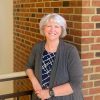This article is more than 5 years old.
Several weeks ago, I had the honor of being invited to speak as a Visiting Scholar for the University of Nebraska Libraries in Lincoln, Nebraska. In addition to speaking about academic freedom and the connection with archives, I also participated in a roundtable discussion relating to university yearbooks. We discussed how access to offensive images and language can be uncomfortable for universities but agreed that the most important thing archivists can do is provide important historical background and context for these materials.
Some brief excerpts from my presentation follow below:
Research, and the broadest sense of the historical record is based on, or depends upon, the quality and amount of historical records available for the types of stories we can tell. The expansion of the documentary record, particularly the creation of materials giving a much-needed view of marginalized groups long silenced, the explosion of community-based archives, and the digitizing of materials from the past all provide rich new sources for exploration. What impact does this growing plethora of information and data have on our efforts to describe, contextualize, and share the various elements of our complicated histories? At the same time, a growing lack of access to the public record, whether by cost, censorship, a decrease in public funding, or a narrowing view of American citizenship, challenges us. How can archivists, researchers, and scholars reverse this trend and ensure the continued preservation and access to the historical record which defines who we are.
Unfortunately, there are no easy answers for any of these questions. As the American Association of University Professors articulates in their statement on academic freedom “The common good depends upon the free search for truth and its free exposition.” While archives cannot ever hope to completely reflect reality and truth, as has been articulated numerous times–The more complete the archival record, the closer we can come to truth, or at the very least, capture a semblance of the human experience. I want to make it clear here, however, that when I refer to the archival record, I am not only referring to the records we keep in our institutions. This also includes community archives and the many ways people and organizations practice record-keeping, including oral traditions and objects.
Some thoughts on collection development in archives:
What does expanding the historical record offer for archivists, researchers, scholars, students, and the public? It offers the opportunity to share more stories and to better comprehend the complexity of the past. It offers more opportunities for teaching and learning—for scholarship. It reminds us that representation does matters, and it is important for those who have historically been silenced to actively participate in the acts of creating and collecting. It gives a sense of belonging, control, and of identity and connection. There are dangers here, of course—when privacy is compromised, or institutions take materials from their home communities.
What questions we ask, who asks the questions, and who we ask them of directly impacts what quality of record exists. This applies also to the important work of description—the quality of our description impacts searchability and helps our users discover and make meaning of our resources. Enabling broader access through portals such as Nebraska Archives Online allows us to more fully share our resources with audiences as opposed to being siloed away from a search box or never even described in the first place. But again, while we may control those records in our possession, we need to remember there are records and memories that will never belong to us—we need to help others keep their records safe, even if they are not traditionally accessible in the ways we normally consider.

7 Comments on ‘Tanya at the University of Nebraska-Lincoln’
This is such an important area in which archives can help tell the story of under-represented groups by making their records accessible. I’m happy this openness exists in the archives world. Congratulations!
Very fun and thought provoking. I appreciate your reminder that archival collections cannot, even together, “completely reflect reality and truth,” merely document some aspects of human experience.
Kudos on being an invited scholar!
Well done!
I wish I could have been in the audience. May a reprise for a ZSR staff meeting some day?
You bring up some difficult and important points Tanya. Even as we are preserving the record and bringing forth historical context, we need to be mindful that the historical context itself isn’t without bias. It is like a never ending search for truth. Thanks for sharing your insights. And I agree, maybe you can do a reprise for a staff meeting!
Amen to all of this! Thank you for this post, Tanya, and for your insightful comments and work on archives and representation.